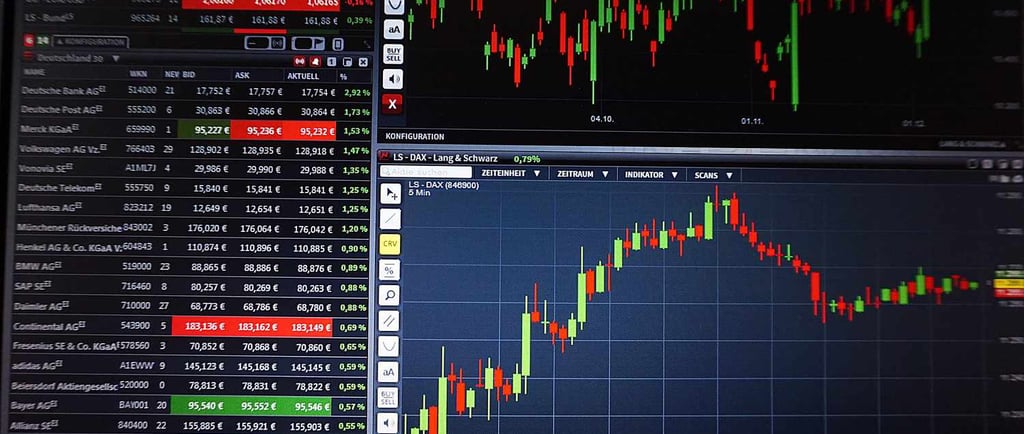Forex Trading vs Traditional Investing: What I Learned Losing $1,000 in 5 Seconds
I flopped... Really flopped.
FINANCE
Eldee
3/17/20253 min read


It was around 2 a.m. Singapore time when I lost $1,000.
I was staring at MetaTrader 4, running on barely any sleep, watching the charts dance in real-time. I had a few indicators on, Bollinger Bands, candlesticks, and trendlines that looked vaguely like Da Vinci sketches. I was tracking the movement between USD/JPY and XAU/USD (gold), because I had noticed something, a correlation. If USD dipped, gold usually rose.
I was convinced I had cracked it.
And then, in five seconds, a massive candle whipped across the chart, a sudden spike I didn’t expect, and just like that, I was down $1,000 in 5 seconds.
No stop-loss. No risk management. Just... wiped.
The High-Stakes Appeal of Forex
Forex trading is seductive. The 24/5 markets, the leverage (up to 1:500!), the idea that you could make money off minute-to-minute fluctuations, it feels like day trading on steroids. When you start learning about candlestick patterns, Fibonacci levels, and price actions, you feel like you’re uncovering secrets to the market.
I read guides. I watched YouTube breakdowns. I subscribed to newsletters like The Motley Fool, filled with self-proclaimed experts flexing their daily profits. I used demo accounts. I practiced. And then I went live.
At first, I made small wins: $10, $50, sometimes even $100. And that’s when it got dangerous. Because I started to believe I knew what I was doing. On my practice accounts, I would put $1000, leave it there for days and come back with $500 profits. I thought it was that easy. What I didn't realize was that the feeling you get when trading with practice money, and real money is extremely different.
What I Thought I Knew, and Why It Wasn’t Enough
I thought:
- Knowing the correlation between USD, JPY, and gold was an edge
- Candlestick wicks and Bollinger band squeezes would predict reversals
- Watching enough “live trade breakdowns” on YouTube would teach me discipline
- I did it with the practice account, I can do it with a live account, it's the same
But I wasn’t truly managing risk. I was chasing movement. I was reacting to emotion, not data. I placed big trades with no stop-loss. I let FOMO drive my decision-making. I was trading in a volatile market I didn’t fully understand. I started putting more money the more I loss. I confused tools with wisdom. I had strategy (or so I thought), but not experience.
How Traditional Investing Feels Very Different
After the loss, I stopped. Completely.
And I started looking into traditional investing. ETFs. Index funds. Even a little into crypto. It felt boring at first, there were no dramatic 5-second wins. But there were no 5-second losses either.
What surprised me most was the peace of mind. Traditional investing gives you time to think. To research. To adjust. It doesn’t reward panic-clicking. It rewards patience. And in 2025, with the global economy as shaky as it is, that slow and steady approach feels a lot more sustainable.
So, Forex or Investing?
If you’re disciplined, well-educated, and emotionally detached, Forex trading can be profitable. But if you’re coming in with dreams of flipping your rent money overnight, it’s a dangerous game. Especially in Singapore, where late-night U.S. market hours throw off your sleep and sanity.
Here’s what I learned the hard way:
- The tools don’t matter if you don’t respect the risk
- $1,000 lost quickly teaches more than any trading webinar
- A calm portfolio beats a heart-pounding trade
I’m not saying never trade Forex. But I am saying, know what kind of investor you are. Some people thrive on volatility. Others, like me, learned they don’t need that kind of adrenaline in their financial life, maybe not without more experience.
Final Thoughts: The Risk Is Real
There’s a lot of hype out there. Instagram reels showing MetaTrader profits. Influencers driving Lambos, selling “signals.” Telegram groups promising “low drawdown, high ROI.” But for every win they post, there’s a graveyard of silent losses.
So here’s my honest advice to anyone looking at Forex for a quick buck:
- Practice with realistic stakes, not dreams
- Respect the market, it doesn’t care about your gut feelings
- Always, always use a stop-loss
And maybe, just maybe, it’s okay to take a step back. Because peace of mind?
That’s worth more than a thousand bucks.
eldeegoh@outlook.com
